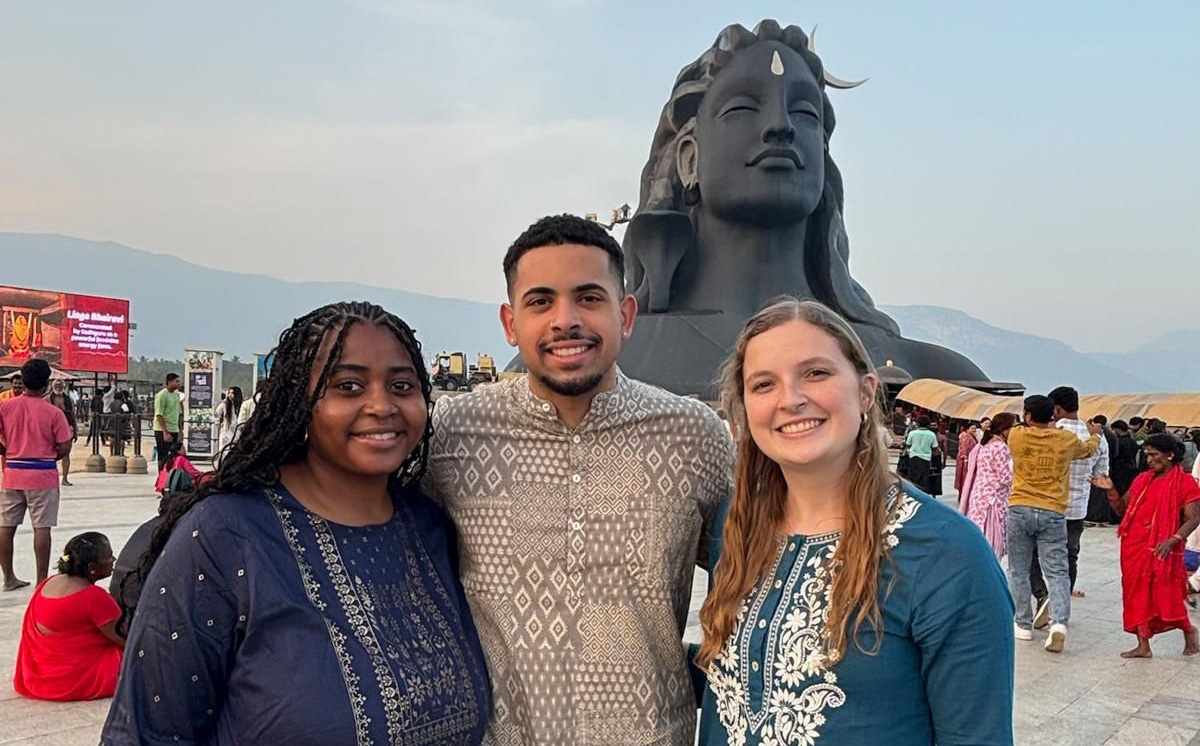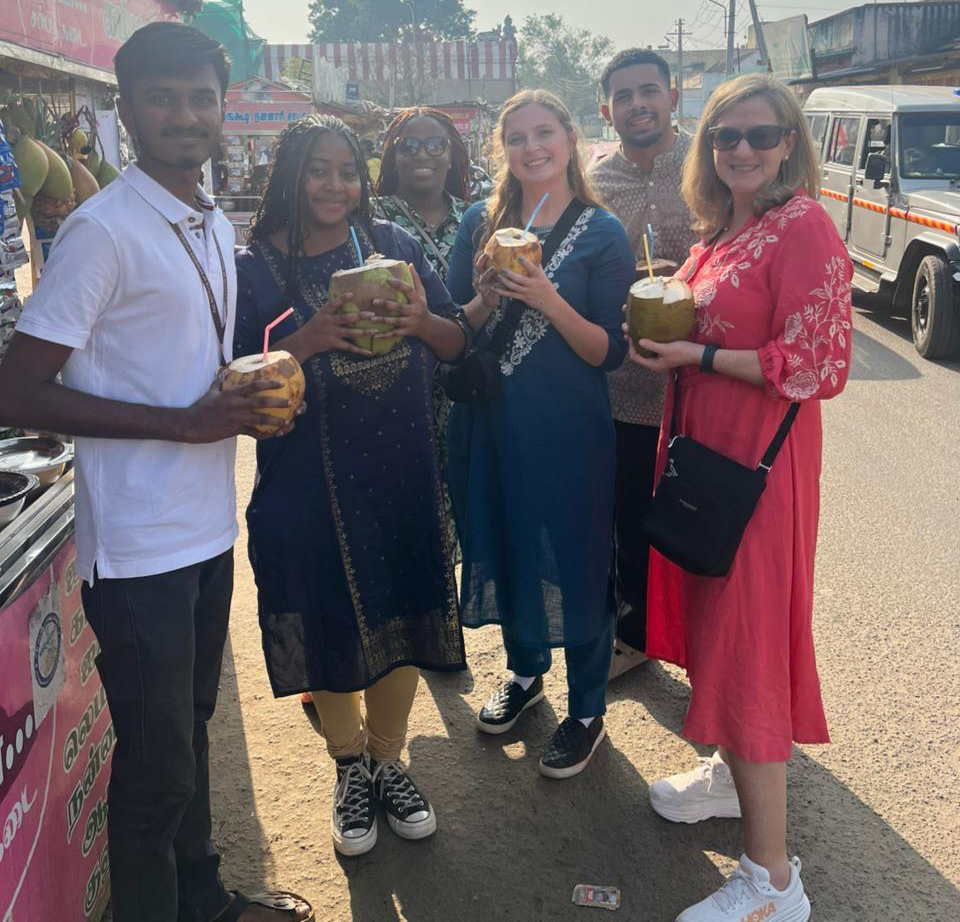Watson College Scholars get international perspective with trip to India
Students connect with peers at PSG School in Tamil Nadu and find new appreciation for other cultures

Stepping outside the classroom and into a new culture can be one of the most transformative learning experiences. This winter, a group of Watson College Scholars had the opportunity to do just that, traveling to India for a global immersion trip that broadened their perspectives, strengthened international connections and deepened their understanding of engineering and technology in a global context.
For many aspiring engineers and computer scientists at Binghamton University’s Thomas J. Watson College of Engineering and Applied Science, having the right support, resources and industry connections can make all the difference in shaping their future.
That’s exactly what the Watson College Scholars Program is designed to provide. More than just a scholarship or academic support system, the program is a gateway to opportunity — one that empowers students from economically disadvantaged backgrounds to excel in their studies and careers.
For Bryan Cabrera ’26, traveling to India over Binghamton’s winter break was nothing short of transformative. The sights, sounds and pace of life were a stark contrast to what he was used to — from the bustling streets to the deep-rooted traditions woven into everyday life. But rather than feeling out of place, he welcomed the differences, seeing them as an opportunity to grow.
Immersing himself in the vibrant culture, Cabrera found himself drawn to the kindness and hospitality of the people he met. Whether it was sharing a meal with a local family, exploring centuries-old temples or navigating the lively markets, every experience broadened his understanding of the world. The journey was not just about seeing new places but about embracing new perspectives, challenging assumptions and fostering a deeper appreciation for the interconnectedness of human experiences.
“Traveling across the world and engaging with people from entirely different backgrounds is an invaluable skill, especially in the professional world,” Cabrera said.
In India, Cabrera was struck by the openness and joy that seemed to flow effortlessly through daily life. Whether it was spontaneous dancing, lively conversations or celebrations that brought entire communities together, people embraced the moment without hesitation. There was no concern for self-consciousness, just a genuine appreciation for life and connection.
Witnessing this unfiltered joy made him reflect on his own way of living and how often people in fast-paced environments forget to slow down and appreciate the present. The experience encouraged him to adopt a more mindful approach to life, carrying with him the lessons of gratitude, spontaneity and deep human connection.
“Their social nature and ability to enjoy life without worrying about judgment were truly inspiring,” he said. Witnessing this firsthand made him reflect on how often people in the U.S. hold back out of fear of how they’ll be perceived. In contrast, the freedom of expression he saw in India was a refreshing reminder that joy is meant to be shared, not suppressed.
Traveling to India gave Cabrera a new perspective on the world and the people in it. From connecting with students at PSG School in Coimbatore, Tamil Nadu, to experiencing both city life and the countryside, he saw firsthand how different cultures approach life in meaningful ways.
He was especially moved by the emphasis on community and togetherness, where people supported one another not just within families but across entire neighborhoods. Whether in the city or rural areas, he noticed a strong sense of shared responsibility and mutual care, something that left a lasting impression on him. This realization deepened his appreciation for human connection and reminded him of the importance of fostering relationships and building supportive communities, no matter where he is in the world.
“This trip taught me to be more open-minded, to appreciate different ways of life and to embrace new experiences with curiosity and respect,” he said. The experience reminded him that there’s no single way to live — every culture has its own values and traditions that make it unique.
Like Cabrera, Katherine Peters ’25 never thought she’d have the chance to travel across the world. The opportunity felt almost unreal.
“I couldn’t believe I had the opportunity to apply, and I was incredibly grateful when I was selected,” she said.
Beyond the academic and professional experiences, Peters was struck by the warmth and vibrancy of Indian culture. From the intricate traditional clothing to the strong sense of community, every moment felt like an opportunity to learn and connect.
She was particularly moved by the deep-rooted traditions that shaped everyday life, from the way families gathered for meals to the colorful festivals that brought entire neighborhoods together in celebration.
The sense of belonging and shared joy was unlike anything she had experienced before. Whether participating in a local ceremony or simply observing the effortless generosity of strangers, she realized that connection wasn’t just a byproduct of culture — it was at its very heart. The experience left her with a newfound appreciation for the ways in which traditions, no matter how big or small, serve to strengthen the bonds between people.
“I was able to fully immerse myself in their traditions and civilization, amazed by their sense of community, appreciation for beautiful clothing and deep connection to their environment,” she said.
For Peters, the trip to India wasn’t just a visit — it was an experience that changed the way she sees everything.
“Reflecting on my time there has inspired me to continue traveling to learn more about diverse cultures, broaden my perspective and deepen my understanding of the world,” she said.
The impact of the India global immersion trip extended beyond the students — it was just as meaningful for Watson College Assistant Dean for Academic Diversity and Inclusive Excellence Carmen Jones, who accompanied the Watson Scholars. She saw firsthand how the experience helped students expand their perspectives and build meaningful connections.
Jones described the trip as just as eye-opening for her as it was for the students. Watching them step out of their comfort zones, engage with local communities and gain new perspectives reminded her why experiences like this matter. She saw students grow not just as engineers but as people — learning to adapt, collaborate and appreciate different ways of thinking. For her, it was a powerful reminder of how travel and hands-on experiences can shape both careers and character.
“The India global immersion experience was the perfect enrichment opportunity for our scholars, giving them a chance to experience another culture and build community with their peers from our partner institution,” Jones said.
Looking back on the trip, she couldn’t help but feel grateful for the experience and the people who made it possible. From exploring historic temples to celebrating local traditions, every moment left a lasting impression.
The journey not only broadened her understanding of a different culture but also deepened her sense of self. Stepping outside her comfort zone, she learned to embrace uncertainty, approach unfamiliar situations with curiosity and find common ground with people from vastly different backgrounds.
“This truly was an experience of a lifetime, and I feel grateful to PSG and everyone who helped make this trip a success,” she said.
For Jennifer Drake-Deese, director of Watson College Advising, the trip wasn’t just about sightseeing — it was about experiencing life through a different lens.
Each moment, from standing before the towering Adiyogi Statue to walking through the tea plantations in Ooty, provided a deeper understanding of India’s rich culture. Along with broadening her knowledge of another culture, the trip helped her to grow personally. She discovered how to welcome uncertainty, approach strange events with interest and find common ground with people from such diverse backgrounds by pushing outside her comfort zone.
The trip was about developing personally, learning fresh ideas and moving those lessons forward—not only about visiting a new area. She knew the experience had molded her in ways she hadn’t expected, so she came home more appreciative of the variety of the planet and the relationships that give it such significance.
“Every moment was a reminder that true learning happens when we step into the lives and experiences of others,” she said.
Watching students embrace new experiences was the most fulfilling part of the trip. Whether celebrating Pongal with the local community, sharing meals with students from PSG College of Technology or navigating the bustling streets of India, each experience pushed them outside their comfort zones.
Through these moments of growth, they not only gained a deeper appreciation for Indian culture but also developed a newfound confidence in themselves. Stepping into unfamiliar situations required adaptability, open-mindedness and a willingness to embrace the unknown — all essential skills that would serve them well in both their personal and professional lives.
With every interaction, they built meaningful connections, proving that curiosity and genuine engagement could bridge cultural differences. By the end of the trip, what once felt unfamiliar had become a source of comfort, and the lessons learned extended far beyond the classroom or career aspirations — they became part of who they were.
“Most rewarding of all was seeing the growth in our students—witnessing them step outside their comfort zones and emerge more confident, empathetic and connected to the world around them,” Drake-Deese said.
Beyond the technical expertise and cultural insights that the Watson College Scholars acquired, the trip instilled a profound sense of global responsibility and awareness. Witnessing firsthand how engineering and technology intertwine with diverse communities and ways of life expanded their understanding of the broader impact of their work.
They saw innovation not merely as a pursuit of advancement but as a means to create meaningful, localized solutions — whether in sustainable infrastructure, education or everyday technology. This realization ignited a deeper sense of purpose, inspiring them to approach their future careers with intention, empathy and a commitment to driving positive change on a global scale.
As Watson College continues fostering these global experiences, students will carry these lessons forward, shaping them into the next generation of engineers, leaders and global citizens.

